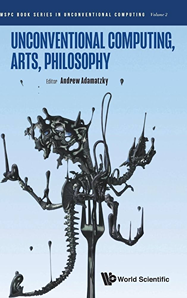Unconventional Computing Arts Philosophy
Material type: TextLanguage: English Series: WSPC Book Series in Unconventional Computing ; Vol. 2Publication details: New Jersey : World Scientific , c2023Description: xiii, 583 p. : illISBN:
TextLanguage: English Series: WSPC Book Series in Unconventional Computing ; Vol. 2Publication details: New Jersey : World Scientific , c2023Description: xiii, 583 p. : illISBN: - 9789811257148
- 003.3 ADA
| Item type | Current library | Shelving location | Call number | Copy number | Status | Date due | Barcode |
|---|---|---|---|---|---|---|---|
 Reference Collection
Reference Collection
|
Reference Section | Reference Section | 003.3 ADA | 2023-24 | Available | 98491 |
AUTHOR
Andrew Adamatzky is a Professor of Unconventional Computing and head of the Unconventional Computing Group at UWE, Bristol, UK. His research interests include non-standard and nature inspired computation, theoretical computer science, artificial intelligence and crowd dynamics, mathematical biology and psychology, non-linear sciences. His recent work has included development of logical and arithmetical circuits in excitable chemical media, slime mould, and liquid crystal figures; and also, development of intelligent massively parallel actuator arrays, formal languages and complexity of cellular automata models, novel types of information processing in memristive devices, design of parallel hybrid computers from living slime mould and fungi. He authored 7 research monographs (published in Springer, Elsevier, World Scientific): Identification of Cellular Automata, Computing in Nonlinear media and Automata Collectives, Reaction-Diffusion Computers, Dynamics of Crowd Minds, Physarum Machines. Reaction-Diffusion Automata, Bioevaluation of World Transport Networks, edited 14 monographs (published in the MIT Press, Elsevier, Springer, World Scientific), authored over 300 papers in peer reviewed international journals, founded the Unconventional Computing Lab at UWE, Bristol, founded two international Journals: Int J Cellular Automata and Int J Unconventional Computing and one book series "Emergency, Complexity, Computation. News stories about Adamatzky research are published in New Scientist, Scientific American, Wired, Technology Reviews, The Guardian, New York Times, etc. He was amongst key figures in the documentary movies The Creeping Garden (2014, UK) and The Blob (2019, France).
SUMMARYThe unique compendium re-assesses the value of future and emergent computing technologies via artistic and philosophical means. The book encourages scientists to adopt inspiring thinking of artists and philosophers to reuse scientific concepts in their works.
The useful reference text consists of non-typical topics, where artistic and philosophical concepts encourage readers to adopt unconventional approaches towards computing and immerse themselves into discoveries of future emerging landscape.
